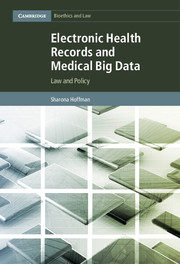7 - Medical Big Data Quality and Analysis Concerns
from Part II
Published online by Cambridge University Press: 30 December 2016
Summary
In 2009, the Journal of Psychiatric Research published an article that linked abortion to psychiatric disorders. The researchers examined “national data sets with reproductive history and mental health variables” to formulate their findings. The study was widely cited among abortion opponents, and several states enacted legislation requiring that women seeking abortions receive counseling that includes warnings about potential long-term mental health problems. In 2012, however, the study was discredited by scientists who scrutinized its design and found that it was severely flawed. The original researchers compared women with unplanned pregnancies who had abortions with all women rather than with women who chose to continue their unplanned pregnancies and have the babies. The study also considered lifetime mental disorders, whereas it should have focused only on disorders that manifested after the pregnancies. Thus what appeared to be solid scientific evidence turned out not to be so.
The security of electronic health record (EHR) databases and potential privacy breaches are not the only concerns raised by medical big data use. Anyone considering the outcomes of records-based studies must recognize the shortcomings of contemporary EHR data and the challenges of inferring causal effects correctly. This chapter focuses on what can go wrong in the process of EHR data analysis and what precautions must be taken to avoid critical mistakes.
DATA QUALITY
Medical databases constitute a potentially invaluable research resource, but researchers, analysts, and other stakeholders must appreciate that existing EHRs often contain errors, are incomplete, or suffer from other inadequacies. While any collection of research data may be contaminated by inaccuracies, medical databases may be particularly flawed. The information in EHRs is initially collected for clinical and billing purposes, and thus it might be ill suited for research. Moreover, the sheer volume of information contained in large medical databases and the complex analytical methods and tools required to conduct large-scale observational studies create myriad opportunities for the introduction of errors and omissions. While improved technology may remedy many database shortcomings in the future, these deficiencies are currently of serious concern. This section examines an assortment of potential data quality defects.
Data Input Errors
Chapter 1 discussed a variety of EHR problems that can be detrimental to patient care. These same deficiencies can taint the quality of research data that originate in EHRs.
- Type
- Chapter
- Information
- Electronic Health Records and Medical Big DataLaw and Policy, pp. 152 - 167Publisher: Cambridge University PressPrint publication year: 2016



